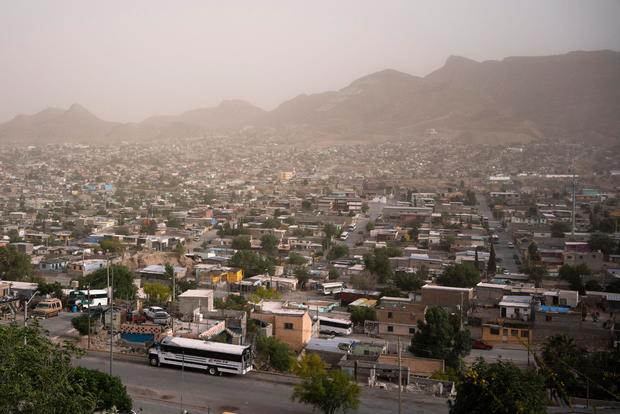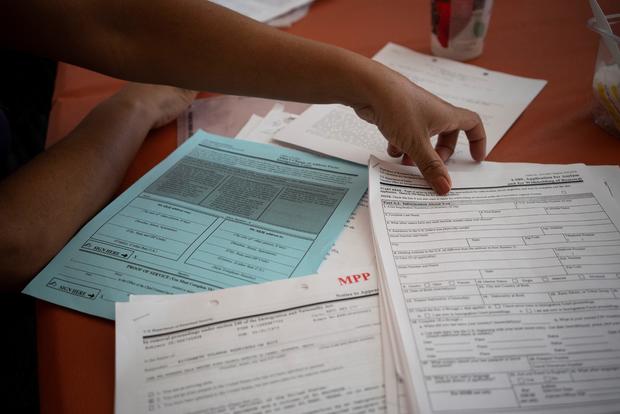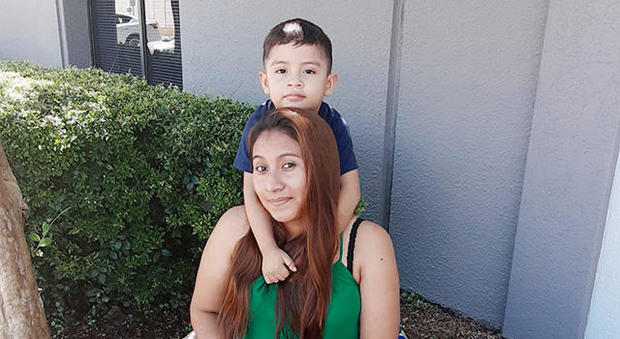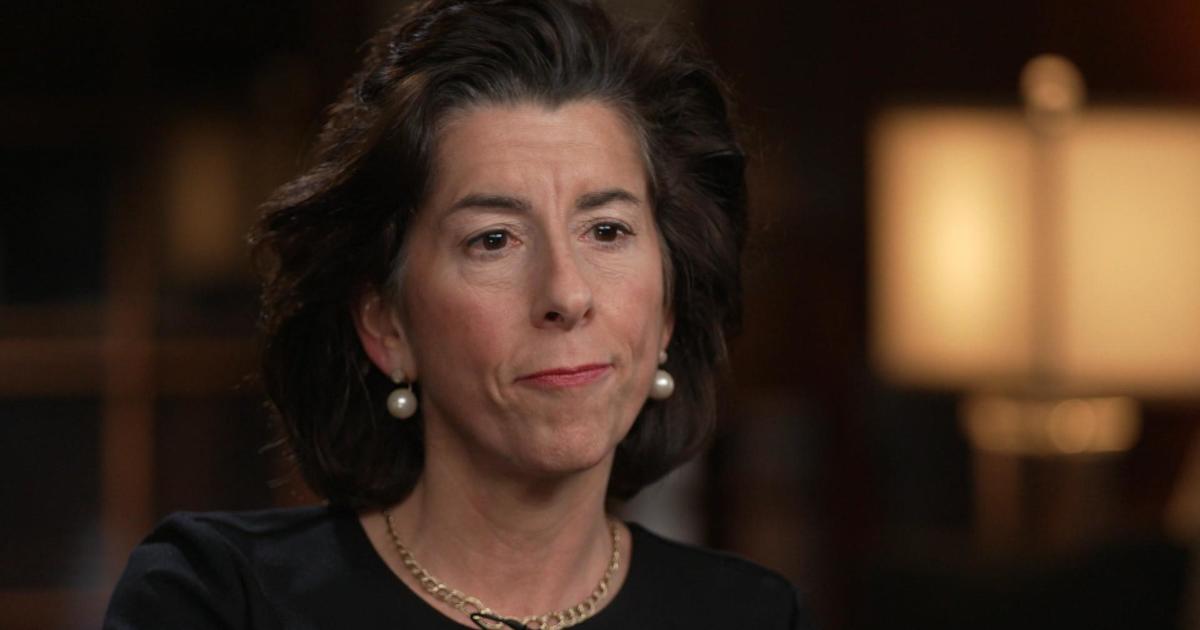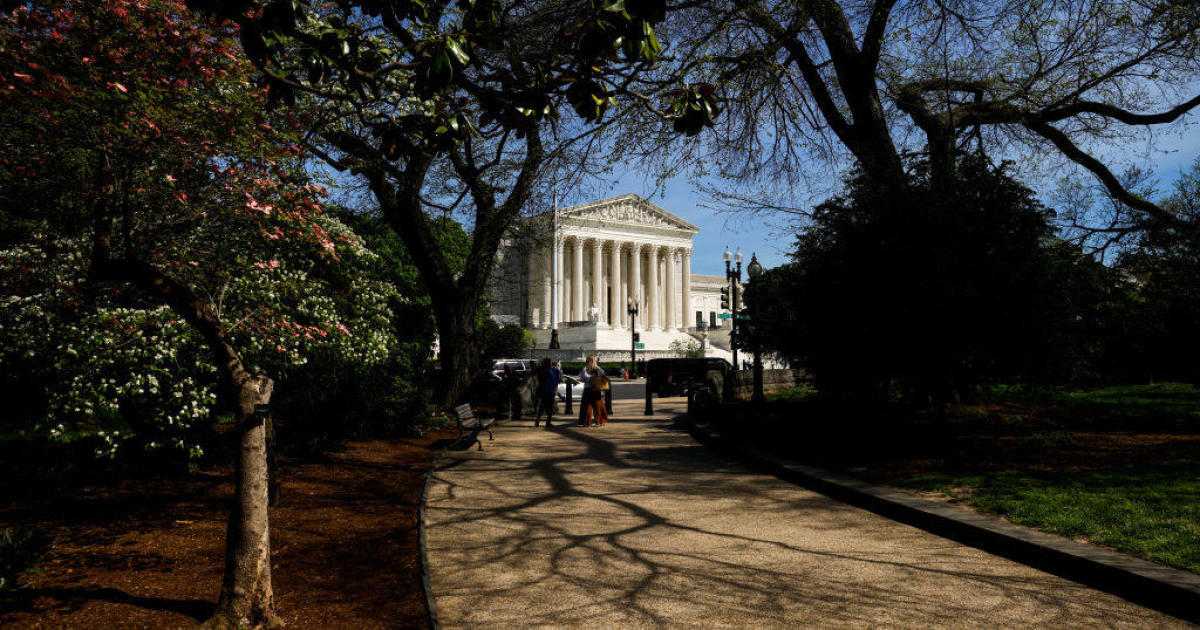"I fear for our lives": Asylum seekers forced to wait in Mexico face danger and desperation
This is the second installment in a three-part series on the Trump administration's controversial "Remain in Mexico" program and its impact on thousands of asylum-seeking families. Read parts one and three here.
El Paso, Texas — One afternoon in late March, as Ricci walked through the markets in Ciudad Juárez looking for somewhere to buy lunch for her 4-year-old son, a man approached the boy and tried to snatch him away.
"Because there were a lot people, I pleaded for help," Ricci said of the brazen kidnapping attempt. She spoke in Spanish with CBS News in the federal building in El Paso, minutes before her hearing in immigration court. "People helped me, and the man was not able to take my son."
Living in Ciudad Juárez, one of the most dangerous cities in the world, was harrowing for Ricci, a 25-year-old single mother from an indigenous community in Honduras. It wasn't her choice to be in Mexico.
Like tens of thousands of other migrants, mostly from Central America, she was placed in the "Remain in Mexico" program when she arrived at the border earlier this year. The controversial program, which the Trump administration is expanding despite a court challenge, requires asylum seekers to wait in Mexico for months while their claims are reviewed in the U.S.
Ciudad Juárez is the destination for migrants like Ricci who seek asylum at a port of entry or another part of the border in the El Paso sector. Beyond the obvious hazards of living in the crime-ridden city, migrants struggle to find shelter, employment and, perhaps most importantly, lawyers who are key to helping them navigate the byzantine U.S. immigration system.
Ricci was more fortunate than others. Unlike most of the migrants subject to this policy, the Honduran mother, helped by her family in the U.S., was able to find legal representation and housing in a motel in Ciudad Juárez.
In late July, Ricci was temporarily allowed back into the U.S. to attend a hearing, where she and her lawyer, Danielle Escontrias of the Catholic Charities of Southern New Mexico, formally filed her asylum petition. Ricci was also there to tell the judge she feared being sent back to Mexico — a sentiment echoed by most families and individuals in the program over the course of hours of court hearings.
"I feel a lot of fear. I can't go out," Ricci said inside a small room where the security guards allow the small number of represented migrants to talk to their lawyers for a few minutes before the judge hears their cases.
"I fear losing my life or my son losing his, or something that can happen to both of us. I fear for our lives," she added, turning to 4-year-old Binsel, who wore a plaid shirt and jeans and wobbled on a chair almost twice his size.
Life in her native Honduras was also very difficult for Ricci. She is shy and mild-mannered, and talks with remarkable stoicism about her husband's gruesome murder late last year.
She and her husband made ends meet by raising corn in Pisijire, a remote village in eastern Honduras, nestled between the Agalta mountain rage and La Mosquitia rainforest, the largest swath of wilderness in the region. But like many members of the large indigenous communities in Central America, the couple faced ethnic persecution.
Ricci's home village is plagued by poverty and violent crime carried out with impunity. Horrific homicides headline local newspapers, including the story of a young mother murdered while she was breastfeeding her 11-month-old child and the apparent murder of an 8-year-old boy.
Ricci's 25-year-old husband, Arlynton, was shot and killed last December in a crime deemed a homicide, according to a local police report. Forensic photos seen by CBS News showed his body with gunshot wounds in his torso.
Soon after his murder, Ricci said she began to receive death threats. A letter left on her doorstep read, "I want blood to continue running. After your husband, you are next, Ricci, and your son. And then your family."
That prompted the young widow to take her son on the perilous, weeks-long journey to the U.S.-Mexico border, where she sought asylum at a port of entry in El Paso in March — the same month that the "Remain in Mexico" program was implemented in that sector.
Ricci claimed asylum based on her husband's assassination and the threats she faced in Honduras. But the U.S. government does not take those circumstances into consideration when determining whether to return her to Mexico.
After her first two hearings in El Paso, Ricci was referred to asylum officers for so-called "non-refoulement" interviews, offered when asylum seekers express fear about returning to the country to which the government seeks to send them.
On both occasions, she said she told the officers about her husband's murder in Honduras and the attempted kidnapping of her son in Mexico. And yet, after both interviews, she was still sent back to Mexico.
"She's in a very difficult situation because she is having a hard time in Mexico but she's also really afraid of going back to her own country," Escontrias said, noting her client's growing desperation. "She's very fearful and stuck between very, very difficult choices."
Minutes before Ricci went in to see the judge for a third time, Binsel was growing impatient. "Mama, where are we going?" he murmured.
Asked if she believed she could survive more months waiting in Mexico, Ricci paused and began rubbing her legs with her hands in agitation. "I don't know," she said, breaking down into tears.
Escontrias, her lawyer, said Ricci was referred to a third non-refoulement interview during her hearing, which CBS News was barred from observing. But she did not hear from her client for a week.
"The people themselves are being burned out"
Escontrias is only one of a handful of attorneys in the El Paso area representing a few of the thousands of migrants sent to Ciudad Juárez under the "Remain in Mexico" policy.
Along with Ricci, she had also been representing another asylum seeker, a 21-year-old woman from El Salvador named Cindis, whom she began representing in April, the same month Cindis was placed in the Migrant Protection Protocols (MPP) program, the Trump administration's official name for Remain in Mexico.
In early August — a week after Ricci's third hearing — Escontrias went to the El Paso immigration court on behalf of Cindis, who was to have her second asylum hearing. She knew that it was unlikely Cindis would show up.
Cindis had already told one of Escontrias' colleagues at Catholic Charities that she had received death threats in El Salvador from a gang, which she said tried to coerce her into prostitution. While she waited in Ciudad Juárez, Cindis said she was robbed, assaulted and targeted with anti-immigrant slurs.
Cindis had only met Escontrias once, during her first court hearing in El Paso. Because Cindis didn't have a cell phone, their communication was very limited. She was also staying in a shelter and had no access to a phone. Over the past weeks, Escontrias had tried unsuccessfully to reach Cindis.
"It's extremely frustrating," Escontrias said. "And it's the reason why people don't want to take these cases, because it's a pretty terrible way to represent someone. You're putting your name on all these documents and you can't really communicate with them. You don't know where they are."
On that August day, the judge order Cindis deported "in absentia," effectively nullifying her asylum claim and barring her from entering the U.S. for 10 years.
Escontrias was livid about the judge's ruling, telling him that the U.S. government's implementation of the program hinders her ability to represent migrants like Cindis. "I had a lot to say on the record about how unfairly we're sending people to third countries that are unsafe and then giving them in absentia orders. It just seems really cruel."
"That's not justice," she added.
A few days later, a friend of Cindis told Escontrias that Cindis had — out of desperation — decided to return to El Salvador. For Escontrias, the outcome of Cindis' case is a clear illustration of the way the MPP program is designed to deter asylum seekers and those who try to help them.
"This is a very effective program," she said. "There's no doubt that they are succeeding, because they're burning out the judges. They are burning out the attorneys. They're making representation so hard. And then the people themselves are being burned out."
"Work, fight"
After seven days, Escontrias finally received a WhatsApp message from Ricci. The U.S. government had removed her from the MPP program and granted her release into the U.S.
Escontrias was happy for Ricci but confused. After her two previous interviews, she had still been sent back to Mexico. Even some of the asylum officers conducting the non-refoulement interviews have acknowledged it is almost impossible for migrants to satisfy the burden of proof.
"It was her third shot at it and facts had not changed. So, it could've been luck of the draw. It could've been that she just got an asylum officer who felt bad for her," Escontrias said. "Or they could've gotten wind that she talked to a reporter. It's very unusual."
Ricci, too, was surprised she was allowed to say in the U.S. But she also said there was something different about her third plea.
"I say it was because the one who interviewed me was a woman. Previously, it had been men," Ricci told CBS News in a phone call from Austin. "She also interviewed my son and he started crying. He told her he did not want to go back to Juárez, that he was really scared and wanted to be with his grandfather."
After her third interview, the young Honduran mother said she was detained for three days in the U.S. before being fitted with an ankle bracelet and released. She spent a few days in an El Paso shelter, where volunteers helped her board a bus to Dallas and then to Austin, where her father lives.
Unlike her interview in that small room outside the El Paso courthouse, Ricci sounded relieved and calm during the phone call last week. She admitted she had been growing desperate in Ciudad Juárez. Now, she said she was "happy, mostly because of him," referring to Binsel, her son.
"He feels very good. He's very happy to be here," Ricci added, referring to her father's home in Texas. "He says it is very pretty here. He really likes going to the park. And he says he's not scared here."
Ricci is scheduled to have a fourth and definitive hearing on her asylum case in early October. It's scheduled in El Paso but Escontrias is working to move it to the immigration court in San Antonio, closer to Ricci's new home.
Asked about her plans now that she's finally in America, Ricci said, "work, fight to provide for him," referring to her son, who, imitating her, could be heard yelling "work!" in the background.
Editor's note: The names or surnames of migrants featured in this series have been omitted because they currently have ongoing cases in immigration court.
